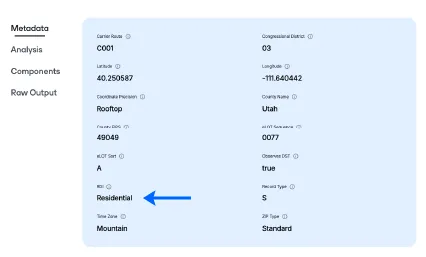What is RDI, and where can I find it??

RDI stands for "residential delivery indicator." This data point is furnished by the United States Postal Service (USPS) and tells you whether a mailing address in the US is a residential or business location.
The USPS keeps track of addresses registered specifically for commercial use, and it has set up its database so that businesses with authorized programs and CASS-certified address software can access that data. If you ship packages to customers, this is good to know! Private shippers often charge more for delivering to residential addresses; some even charge a fee if you get the address wrong. For example, if you mistakenly label a residential address as a business, they may charge you to fix it.
Smarty® has address verification tools that provide RDI status as metadata for your analysis. Whether you need to check one address or a whole bunch of addresses to see the USPS RDI indication, we’ve got your back. Feel free to try out some of our tools below. We return the RDI status of every address as part of the included metadata set.
| Single address RDI check | Bulk address RDI checker | RDI check via API |
|---|---|---|
Now that you know RDI doesn’t stand for really dramatic interpretation (although wouldn’t that be fun?), we can get started on learning more about the RDI. In this article, we'll discuss the following topics:
- Residential vs. commercial address
- Residential delivery indicator (RDI)
- Private carrier 'residential' vs USPS 'residential'
- How to use the USPS RDI
- Conclusion
Residential address vs. commercial address
Why does the type of address even matter? Shipping can be a funny business sometimes. Mail carriers, be they private or otherwise, sometimes make decisions or take actions that seem… strange to the rest of us. The residential address vs. commercial address issue is one such topic.
Most private mail carriers charge one rate for shipping to a commercial or business address and another for shipping to residential addresses. The address type matters to your business because types of addresses differ in price for the other guys–residential rates are typically higher.
Unfortunately, there’s no way to intuitively determine if an address is a home or an office. Shipping something to 221B Baker Street expecting it to be a business address might land you in unexpected fees territory if it’s actually a residential address.
The reason is this: private mail carriers primarily service business locations. The vast majority of their work takes them to commercial and industrial districts. While they do deliver to residential areas, it's often outside of their normal routes. If they're going to drive over the river and through the woods just to bring you cookies from your grandma's house, they're more likely to ask for a little something extra on your shipping rates to compensate for it.
So, how do you determine, before the additional shipping charges, if an address is a commercial building or a residential address?
That's where RDI comes in.
Residential delivery indicator (RDI) meaning in business
Since the USPS organizes and manages the authoritative address database for the US, they already know if an address is residential or business. And the way that they share that data is through the residential delivery indicator or the RDI.
For businesses, the residential delivery indicator shows whether or not the delivery address is residential. Pretty simple, right? So why would the USPS share this data with you? They have an ulterior motive.
Unlike private carriers, the USPS doesn't charge different rates for residential address delivery.

So, if you know that UPS and FedEx will charge you extra to ship something to an address just because of the type of address, it means you might prefer to go through the USPS instead. It's not a bad option, especially if your primary issue is the additional cost non-USPS couriers would charge you.
The bottom line is that understanding RDI's meaning in business allows you to reduce your shipping expenses. Want more? See how A3 Freight saves 6% on freight audits and 18% on spend analytics by using the RDI flag and address standardization included in Smarty's US Address Validation service.
Private carrier 'residential' vs USPS 'residential'
The USPS isn't the only delivery service that knows if an address is residential or commercial real estate. Private carriers also classify if an address is residential or commercial.
However, private carriers may classify an address as 'residential', which the USPS classifies as 'commercial.' Why?
When private carriers like UPS and FedEx classify locations as "commercial" or "residential," the classification is largely dependent on location, not the actual usage of the property.
Cities divide themselves into different "zones," like residential, industrial, or commercial. These zones often restrict what can be built where, and overall, they cause things to be built in their respective zones. Residential structures typically are built in residential zones, and commercial structures are built in commercial zones.
In other words, for private carriers, an address in a residential zone is a residential address, regardless of the structure's actual use. All other addresses are considered "commercial" and pay the lower rates.
That means that, according to the likes of UPS or FedEx, if your good buddy Greg chases his dream and builds a poodle salon in his home garage, that business is still classified by the zone it's in (residential). So, sending anything to him will require you to pay a higher rate when shipping via private carriers, even though you may be mailing something to his business and not to his personal residence.
By contrast, the USPS RDI tells you what use a location has rather than what zone it's in.
So, if your buddy Greg's poodle salon is a commercial use even though it's located in a residential zone, the USPS will tell you that your parcel will be going to a business location, even if the city has zoned the property as 'residential'.
How to check if an address is residential or commercial using USPS RDI and Smarty
So, how do you use the USPS RDI? The simplest way is to check an address with a residential or commercial address checker like the one built into Smarty's US address validation service. Our residential or commercial address checker gives you access to the RDI as part of the metadata returned on every address. It also standardizes, validates, and parses the address too. You're welcome!
If you want to know where to find this fun little bit of information, here's what our output looks like on our single address validation tool.

Conclusion
The USPS Residential Delivery Indicator or RDI can tell you if an address is residential or commercial.
Need more clarification? Feel free to get in touch with us personally. We can shoot the breeze about our services, RDI, where to find RDI in our output, or even whether RDI is actually telling you what you want to know. We're happy to answer any of your questions, help you figure out which term to classify your address as, and ultimately get you into the right "zone." We're fully prepared to make the work of determining "residential" or "commercial" easier.